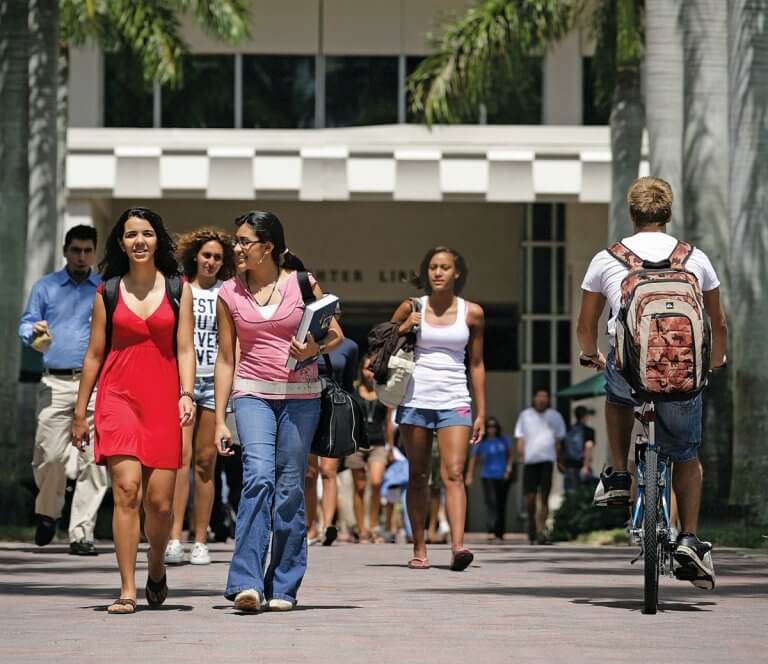
Fernando RM Bertoncello has no regrets. While many Brazilian students chose to go to grad school in Portugal or Spain, the 30-year-old decided to head to the University of Miami’s School of Law (Miami Law) instead to pursue his LL.M in International Law.
There is the appeal of lower costs elsewhere in the world, but to Bertoncello, rankings and a personalised admissions is worth the extra cash.
“Miami Law school had a higher ranking than any university in Brazil,” he told Study International.
Pre-Law Magazine lists the school as one of the “20 Most Innovative Law Schools” in the US and overseas. Similarly, Innovation 800, published in 2017 by Cambridge University, included Miami Law as a “Leader in Learning” and one of the most innovative law schools. Billboard Magazine names it as one of 12 leading schools for music law last year, and International Jurist Magazine listed it as a “hot spot for international law” this year.
With attentive staff helping him through the application process and several personal meetings with the school’s International Graduate Programs Director, Carmen Perez-Llorca, the choice on where to go to grad school became as clear as day.
“In the end I only applied to Miami Law,” he says.
Bertoncello’s experience explains only a fraction of what makes Miami Law School a popular choice among brilliant legal minds from abroad.

Source: University of Miami
First, there’s the location – with nearly 1,400 corporations, this Florida city is home to headquarters for multinational corporations like Disney, Sony, and FedEx; plus dozens of headquarters for US companies including Office Depot, American Airlines, and Hewlett-Packard.
Federal agencies – including the Securities and Exchange Commission and the US Department of Homeland Security – have offices here. As the largest financial capital in the US after New York City, South Florida has become a leading center of international tax planning, arbitration, and asset management.
Having this huge concentration of companies and agencies in one location enables the driven law student to pick from an expanded list of career-building and externship opportunities.
“I have only been here two months now, but it’s obvious that Miami School of Law is ambitious in presenting different career development opportunities to its students through the Career Development Office,” says Eva Baldursdottir, an international law student at Miami, originally from Iceland.
“I was not accustomed to such services at my university,” she adds. “Although I haven’t been here long, I already have a job as a research assistant to a professor in a field of my interest, and I think it’s an excellent experience and chance to advance my knowledge.”
Thaisa Wosniack, a Master’s graduate in International Arbitration from Miami Law, describes this as the school and the city’s upper hand over other global regions and universities.
“The most valuable contribution of Miami Law is the practical courses, internships opportunities and research positions. The course prepares its students for professional development in US. During the course students may attend international arbitration events organized by the faculty and have the opportunity to participate in international job fairs,” she says.
Studying at Miami Law, international students like Bertoncello, Wosniack and Baldursdottir get the full range and breadth of both US and international law. Lawyers in South Florida practice in numerous courts, including the US 11th Circuit Court of Appeals and the area provides students access to dozens of agencies and courts – state and federal, trial and appellate, bankruptcy, immigration, family and more.
With top attorneys and alumni serving as adjunct professors and mentors, students get to tap into their far-reaching expertise, be involved in and make meaningful contributions to relevant issues in immigration law, family law, bankruptcy law and more.
For International Arbitration students, it’s hard to beat Miami’s significance as an arbitration hotspot – this is the best thing about Miami as a global study destination, according to Wosniack.
As Florida is considered an arbitration-friendly jurisdiction, the city is relatively cost-effective when compared with traditional seats such as London and Paris. Being close to Latin America and with a multilingual tradition, the city’s law firms have an advantage in assisting clients and disputes in Spanish and Portuguese.
Wosniack had the opportunity to capitalise on this when she got to intern at a Florida law firm during her LL.M..

Source: University of Miami
Miami Law School offers several LL.M. graduate programs for foreign-trained law students and lawyers. There’s the General LL.M. Program (US & Transnational Law for Foreign-Trained Lawyers) and Specialised LL.M. Programs in areas such as International Law (Inter-American), Maritime Law and Tax Law, to name a few.
Since hands-on learning is the education philosophy at Miami, students are encouraged to participate in the city’s ready-made laboratory for legal training in various fields. In addition to practical experience, programs like Moot Court, Practicums, Litigation Skills Program and Judicial Clerkships, Miami Law students obtain academic credit while working in a real-world legal setting through externships and fellowships.
Opportunities like these open many doors for students. For Wosniack, it landed her the current position she holds as a foreign law clerk at Shutts & Bowen LLP, where she had earlier interned as an LL.M. student. Today, she leads the development of the firm’s Brazilian practice at the Am Law 200 firm.
But that’s not all; since joining Miami Law, Wosniack’s career has been on the upward trajectory. Originally from Brazil, she had worked as a research assistant at the university in the Menstschikoff Project led by Professor Marike Paulsson and the International Arbitration Institute – the latter even awarded her a scholarship. At the end of the course, she received the Dean’s Certificate of Achievement Award for Conflicts of Law and sat for the New York Bar.
She calls all this “the most valuable contributions of Miami Law” towards her career. The school’s amazing campus to enjoy, the ‘Canes tradition and games to follow and a diverse student body (58 percent speak one or more foreign language and 50 percent identify as a member of diverse group) only amplify this fact.
As Wosniack explains, “Being a Miami Law alum is to be recognized as student of one of the best universities in the state and to be respected for your career trajectory.”
Follow Miami Law on Facebook, Twitter, YouTube, issuu, Flickr, Instagram and LinkedIn
Liked this? Then you’ll love…
The lucrative business of Art Law
Law at Miami: Education, culture, lifestyle and opportunity in abundance







